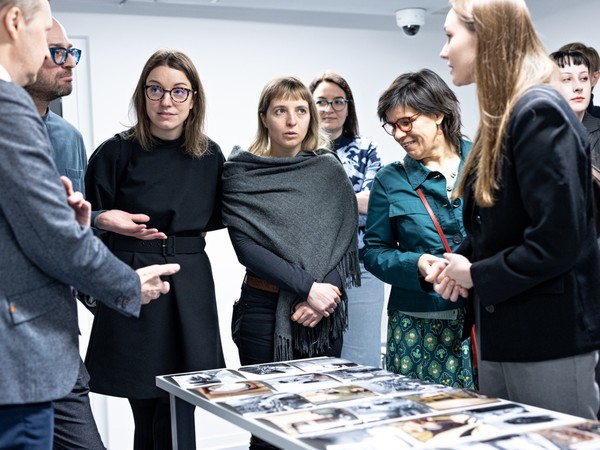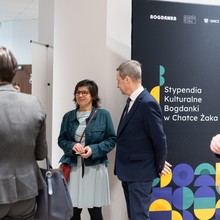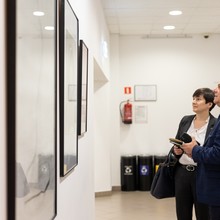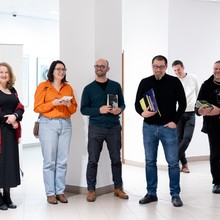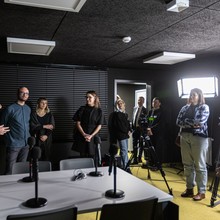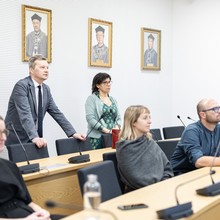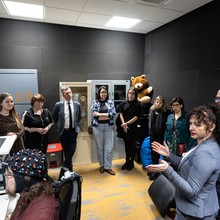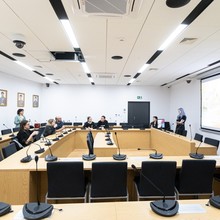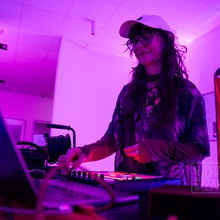As afternoon turns into early evening, the orange light of day is slowly fading from the windows of the dominant high-rise building of the Rector’s Office of Marie Curie-Skłodowska University in Lublin, Poland. We are walking through the campus, surrounded by student dormitories and the ubiquitous tall trees, leafless now in February. We are approaching Chatka Żaka, a vast cultural centre complex with an impressive cinema, several exhibition spaces, a student bar, and study rooms. This is where the Lublin people invited us to present Palacký University and Olomouc in terms of culture, in a two-day event called “From Olomouc to Lublin”.
Loyal alumni in place
One year ago, in February 2023, the new director of the Czech Centre in Warsaw was appointed. Petr Vlček, a graduate of Polish Studies and Film Studies at the Palacký University Olomouc Faculty of Arts, began developing the idea of a possible close cooperation between Olomouc and the Marie Curie-Skłodowska University in Lublin (UMCS) soon after he took office.
“I knew that good personal contacts had already been established here, not only among Polish studies departments, but also at the level of rectors and individual researchers. So I was happy to facilitate the presentation of other cultural and artistic activities conducted at UP that might be attractive to a young Polish audience.”
A large delegation set out from Olomouc, consisting of representatives of the Academia Film Olomouc festival, Palacký University Press, Vice-Rector for Communications and Student Affairs Andrea Hanáčková, as well as partners from the Olomouc Museum of Art (MUO).
Throughout the three-day visit, we were tirelessly accompanied by Bogdan Łukasik, Honorary Consul of the Czech Republic and our attentive host. The programme is busy: we are presenting the AFO by means of Czech television documentaries, launching an exhibition with the Olomouc Photographers book series, which is a collaboration between the MUO and UP Press, then opening a debate on queer issues, and organising an evening party. A mini-festival and “cultural diplomacy” in the name of Olomouc.
On the radio, in the cinema, at the opening
We feel at home. We are surrounded by the warm-hearted community of Chatka Żaka, the UMCS management headed by Rector Radosław Dobrowolski, local journalists, students. We speak in Polish and Czech, and when detailed understanding between two Slavic languages becomes difficult, also in English.
There is a large television and radio studio in Chatka Żaka. When we mention we’d like to see it, we’re immediately taken to a live broadcast. Unlike our Olomouc student radio station UP AIR, which has been focusing on podcasts for the last few years, the broadcast here goes the traditional way – “on the airwaves”. Lublin student radio is listened to not only by the community of 60,000 students, but also by drivers and passengers in city taxis and many Lubliners.
“We have given a lot of thought to what kind of films to bring,” says Ondřej Kazík, the head of programming at Academia Film Olomouc, when opening the series of documentary screenings. The themes of environmental and climate change as well as human sexuality and identity resonated with the audience. “The selection of films from the 2023 AFO Czech Competition corresponds with the diverse interdisciplinary focus of our domestic filmmakers; we have also taken into account which films of the 58th edition were successful with our audience and awarded by the international jury. The meditative winner of the Czech Competition, Invisible Landscapes, encouraged us to listen to the climate, while social themes were unlocked by the colourful and creative Humans showing the lived realities of non-binary and trans* people in the Czech Republic. The themes of films produced in Czechia also resonated well with the local audience. The screening of The Orgasm Chronicles touched on the very lively topic of abortion rights in Poland.”
Rector Dobrowolski and his four-member vice-rector team are present at all screenings of the festival films, discussing them passionately. As a geographer, the rector very much enjoyed their themes of sustainability and climate change. As a researcher, he has himself twice visited Svalbard, the subject of one of the films, and recognised many locations in the film. He raises a glass of wine and makes a toast to the exhibition that has just opened.
On the walls hang carefully selected photographs ranging from the avant-garde through documentary photography and enigmatic female nudes to the postmodern present; a collection that the MUO curator Štěpánka Bieleszová, UP Press director Aleš Prstek, and photographer Petr Zatloukal came to present in Lublin.
The award-winning project and book series Olomouc Photographers maps important art photographers associated with the Olomouc region.
Generous space and the latest technology for research
We admire the diverse environment of UMCS and the new American Center. Wieslaw I. Gruszecki, Vice-Rector for Science and International Cooperation, proudly shows us around and tells me that they have modelled this university facility after Olomouc’s American Center. When they visited us last year at Palacký University, they realised that, just like in Olomouc, thousands of foreign students study in Lublin. Establishing the centre was then a matter of a few months for them.
The local eagerness and energy were evident throughout the next day, too. The Lubliners admire our 450-year history and ask a lot of questions about our faculty system, science evaluation, and public relations. However, they are not lagging behind in anything, considering their size and national importance. The fifth largest university in Poland will celebrate its 80th birthday this October, so the long history of Palacký University seems impressive to the local academics. On the other hand, our delegation immensely appreciates their hospitality, the generous design of the university campus, and the facilities of its faculty buildings.
The practical study of journalism combines all the best parts of an interdisciplinary approach, the use of multimedia, mastery of all the necessary skills, and a great deal of encouragement towards personal inventiveness. We see great student short films, photo projects, the podcast and television studio, and well-equipped computer labs. The Faculty of Education conducts the most extensive research activities in Poland, with a specific focus on Montessori methods. Modern research on neurological excitation in the learning process and in attention disorders has been carried out here for many years in cooperation with many primary and secondary schools, and it has borne concrete research results translated immediately into the practice of counselling centres and special education. The campus buildings most resemble the UP complex in Holice. These are modern, newly conceived faculties with a progressive tendency towards science and technology transfer – an area in which they are very interested in collaborating with Olomouc, too. The representatives of UP Press and UMCS Press are also discussing the possibilities of cooperation and especially the exchange of knowledge. They find parallels, intersections, and inspiration.
Lublin parallels
Only on the third day, in the morning before hitting the road back to Olomouc, do we have time to take a breather and look around, after such an intensive programme. Outside the windows of the hotel room, the sun rises and bathes the skyline of Lublin, a vibrant city with four universities. It is as big as Brno, a genuine student town, functioning as the cultural centre of its region. The rich and profound Jewish history is ubiquitous in the streets, a history that was sadly extinguished in the nearby Majdanek concentration camp during World War II, but has become essential and immortal to Lublin’s contemporary student element. In the 1930s, Lublin’s Jews founded a major yeshiva, at the time one of the largest Jewish educational institutions in the world. And it was its building that served after the war as the birthplace of the newly founded and now eighty-year-old Marie Curie-Skłodowska University. Today, the UMCS has metamorphosed into a complex university and modern scientific body which has a lot in common with us in terms of their main principles and which offers opportunities for close collaboration. I look forward to seeing all the areas where our universities find points of contact and common ground. I can already think of several themes of mutual interest.
Andrea Hanáčková
Vice-Rector for Communications and Student Affairs
